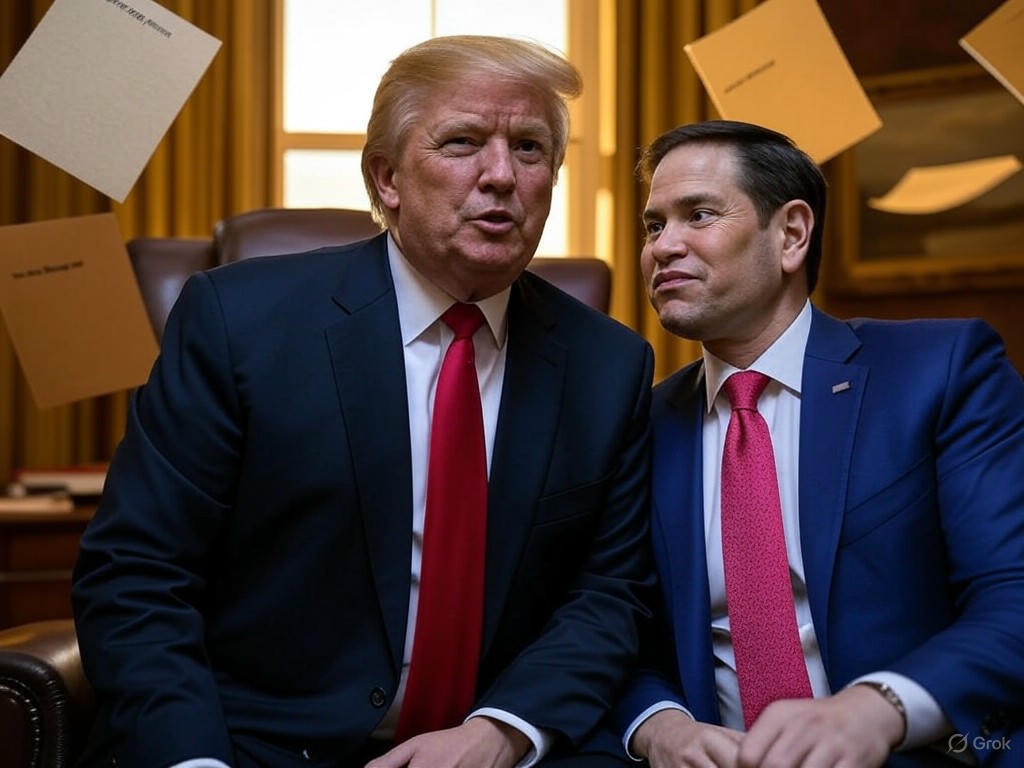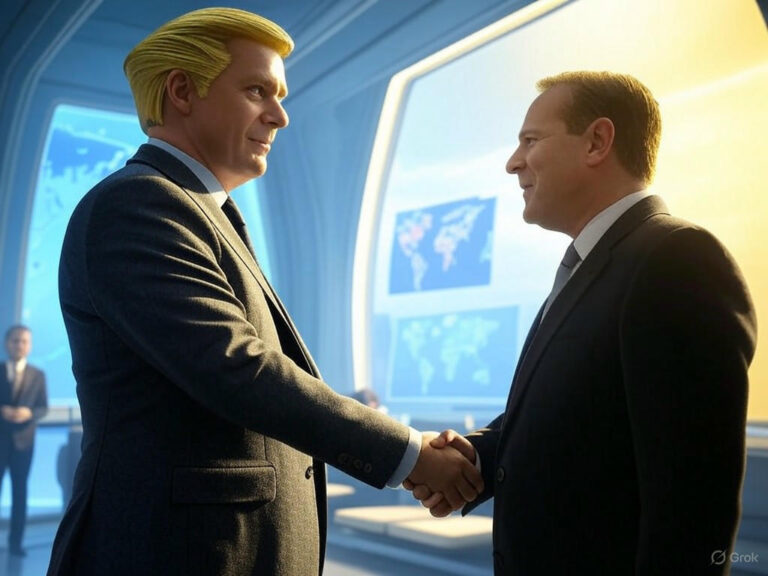
Trump Appoints Sixth National Security Adviser
The Latest on Trump’s National Security Adviser Shakeup
In a bold move that highlights ongoing changes in the Trump National Security Adviser position, President Donald Trump has announced a significant reshuffle just three months into his second term. National Security Adviser Mike Waltz is stepping down, nominated for the role of United States Ambassador to the United Nations, amid scrutiny over his handling of sensitive information. This transition marks Trump’s sixth appointment to this critical post, underscoring the challenges of maintaining stability in high-stakes foreign policy roles.
Have you ever wondered how quickly leadership changes can reshape an administration’s direction? Trump’s decision reflects not just a personnel shift but a potential realignment of priorities. Secretary of State Marco Rubio will now take on the Trump National Security Adviser duties, blending diplomacy with security coordination in an unprecedented way.
This isn’t just about filling a vacancy; it’s about addressing internal pressures and controversies that have plagued the Trump National Security Adviser team from the start. As we dive deeper, you’ll see how this appointment could influence U.S. global strategy moving forward.
The Signal Messaging Controversy Unraveled
At the heart of Waltz’s exit lies the Signal messaging controversy, a mishap that exposed vulnerabilities in the Trump National Security Adviser operations. Back in March, Waltz inadvertently included journalist Jeffrey Goldberg in a private chat discussing a planned military strike against Houthi targets in Yemen. This error leaked details like strike timings and weapon specifics, raising alarms about information security.
Defense Secretary Pete Hegseth, Director of National Intelligence Tulsi Gabbard, and CIA Director John Ratcliffe initially downplayed the incident, but Waltz later confirmed the details behind closed doors. For anyone following Trump National Security Adviser news, this episode serves as a stark reminder of how a single mistake can escalate into a full-blown crisis. Imagine the fallout if similar errors occurred in other high-profile roles—what would that mean for national trust?
President Trump initially stood by Waltz, calling him “a good man” who learned from the slip-up, but the damage lingered. This situation exemplifies the intense scrutiny that comes with the Trump National Security Adviser position, where every decision is under a microscope.
Lessons from the Trump National Security Adviser Blunder
Experts suggest this incident highlights broader issues in communication protocols within the Trump National Security Adviser framework. If mishandled, digital tools like Signal can turn into double-edged swords, potentially compromising operations. For teams managing global threats, adopting robust safeguards could prevent such oversights and strengthen overall strategy.
Think about how everyday tech errors in your own life might escalate—now scale that to international affairs. This case offers a valuable lesson: always double-check before hitting send, especially when the Trump National Security Adviser role is on the line.
Deputy’s Departure and Wider Implications
Alongside Waltz, his deputy, Alex Wong, is also leaving, adding to the ripple effects in the Trump National Security Adviser circle. Sources indicate both exits were set for May 1, 2025, leaving the National Security Council in a state of flux. White House Chief of Staff Susie Wiles has been navigating these transitions, discussing potential fills with staff.
This dual departure raises questions: Is this a targeted cleanup or a sign of deeper instability? In the world of Trump National Security Adviser appointments, such moves often signal a push for fresh perspectives or loyalty alignments.
While the Council hasn’t commented publicly, the void could disrupt ongoing initiatives. If you’re tracking Trump National Security Adviser changes, consider how this might affect day-to-day operations, from intelligence sharing to policy coordination.
Pressure from the Right Wing
Beyond the messaging fiasco, far-right influences like Laura Loomer have reportedly pushed for changes in the Trump National Security Adviser lineup. In an Oval Office chat, Loomer urged Trump to remove aides not fully aligned with the “Make America Great Again” vision, targeting Waltz as one such figure.
This kind of internal advocacy isn’t new; it’s a dynamic that shapes many administrations, including Trump’s. For the Trump National Security Adviser role, balancing ideological purity with practical expertise is a delicate act. Picture a team meeting where loyalty debates overshadow strategic discussions—it’s a scenario that could hinder effective governance.
Ultimately, this pressure may have tipped the scales toward Waltz’s reassignment, illustrating how external voices can influence key positions like Trump National Security Adviser.
Waltz’s Journey and the Bigger Picture
Mike Waltz brought a wealth of experience to the Trump National Security Adviser seat, having served three terms in the House representing Florida. As a decorated Green Beret and former Pentagon adviser, his military background promised a strong hand in national security matters—yet his tenure lasted only three months.
This brevity echoes the turbulence of Trump’s first term, where he cycled through multiple advisers, chiefs of staff, and secretaries. If you’ve followed political histories, you know that stability in the Trump National Security Adviser role has been elusive, often leading to policy inconsistencies.
Here, learn from history: Rapid changes can either inject new energy or create confusion. For Trump National Security Adviser hopefuls, Waltz’s story underscores the importance of not just credentials, but navigating internal politics.
Marco Rubio Steps into the Spotlight
Now, Marco Rubio takes center stage, assuming the Trump National Security Adviser responsibilities alongside his Secretary of State duties. This dual role consolidates foreign policy power, reflecting Trump’s trust in Rubio’s loyalty and views. Once a rival, Rubio has become a key ally, making this appointment a strategic play.
With Rubio at the helm, expect a more unified approach to global challenges. The Trump National Security Adviser position demands coordination across agencies, and Rubio’s experience could streamline that process. But is this setup sustainable? It might enhance efficiency or lead to overload—only time will tell.
As an example, think of how combining roles in a business setting can boost innovation but risk burnout. Similarly, Rubio’s expanded influence could redefine the Trump National Security Adviser dynamics.
Evolution of the Trump National Security Adviser Role
Historically, the Trump National Security Adviser has evolved from a behind-the-scenes adviser to a pivotal influencer. Rubio’s appointment might mark a new chapter, emphasizing alignment with Trump’s broader agenda. To make this work, clear communication and delegation will be essential tips for success.
A Look Back at Trump’s National Security Advisers
Trump’s history with National Security Advisers is a rollercoaster: from Michael Flynn’s short stint in 2017 to H.R. McMaster, John Bolton, Robert O’Brien, and now Waltz as the fifth, with Rubio as the sixth. This pattern of turnover contrasts sharply with more stable administrations, where the role fosters long-term strategy.
In the Trump National Security Adviser timeline, each change has brought shifts in tone and policy. For instance, Bolton’s hawkish approach differed from O’Brien’s focus on alliances. If you’re analyzing patterns, this frequency highlights the challenges of the job under intense public scrutiny.
What if more stable tenures led to better outcomes? It’s a hypothetical worth considering as we watch Rubio’s era unfold in the Trump National Security Adviser narrative.
Shaping U.S. Foreign Policy Ahead
The reshuffle signals potential shifts in Trump’s foreign policy, with Rubio’s leadership possibly creating a more cohesive strategy. Nominating Waltz to the UN could leverage his skills without keeping him in the Trump National Security Adviser hot seat, though Senate confirmation might be rocky due to the controversies.
Analysts predict this could mean bolder moves on issues like Middle East tensions or China relations. For everyday readers, understanding Trump National Security Adviser impacts means recognizing how these changes affect global stability and U.S. interests.
Actionable advice: Stay informed on international news to see how these appointments play out, as they could influence everything from trade deals to security alliances.
Voices from Capitol Hill
Reactions to the Trump National Security Adviser changes have varied, with Trump’s supporters praising the moves as smart realignments, while critics decry the chaos. The Senate’s role in confirming Waltz will likely involve tough questions about the Signal incident, testing his readiness for the UN post.
This bipartisan scrutiny reminds us that the Trump National Security Adviser position isn’t just internal—it’s a national conversation. What are your thoughts on how these dynamics affect governance?
Future Stability in Question
As we look ahead, the early shakeup in the Trump National Security Adviser ranks challenges Trump’s promises of a smoother second term. With Rubio juggling multiple hats, the focus is on whether this brings the coordination Trump seeks or just delays deeper issues.
Either way, monitoring the Trump National Security Adviser evolution could offer insights into administrative resilience. Consider this a call to watch for further developments—they might shape policy for years.
Wrapping Up the Changes
In summary, the shift from Waltz to Rubio in the Trump National Security Adviser role caps a dramatic start to the term, driven by controversy and loyalty concerns. This isn’t just about names and titles; it’s about the direction of U.S. foreign policy and the lessons learned from rapid changes.
What do you think—will this lead to greater stability or more uncertainty? Share your insights in the comments, explore our related articles on political shakeups, or subscribe for updates on Trump National Security Adviser news. Your feedback helps us cover these topics more effectively.
References
The following sources were used to inform this article:
- CBS News. “Trump shakes up national security team as Mike Waltz departs.” Link
- Star Tribune. “Trump’s National Security Adviser Mike Waltz is out in first major shakeup.” Link
- PBS NewsHour. “Waltz ousted as National Security Adviser, nominated for UN role.” Link
- Australian Competition & Consumer Commission. “The impact of digital platforms on news and journalistic content.” Link
- Howard University School of Law. “Vol.65, Issue 1 (Fall 2021).” Link
- General Services Administration. “2017 September-December emails.” Link
- Center for Economic and Policy Research. “Rebuilding Ukraine: Principles and Policies.” Link
- Royal Society Open Science. “DOI: 10.1098/rsos.240197.” Link
Trump National Security Adviser, Trump administration shakeup, Mike Waltz departure, Marco Rubio appointment, UN Ambassador nomination, White House foreign policy, national security changes, Trump second term, Alex Wong exit, U.S. foreign policy implications







